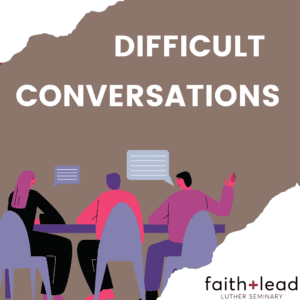“Listen! A sower went out to sow.” Mark 4:3
“What people resist is not change per se, but loss.” Ronald Heifitz
Difficult conversations often sneak up on us. As I sat down with the group of leaders to learn more about a smaller membership congregation, their first question surprised me.
“When do you think it is time for a congregation to close?” After some thought, I replied, “I think a congregation should consider closing when all the congregation’s energy is focused inward and they are not sharing in their words or actions the Good News we know most deeply through Jesus.”
Conversations about viability are needed and helpful when congregations are…
- inwardly-focused
- closed to inviting and receiving the gifts of new and different people
- focused on the past to the point that they fail to invite their members and neighbors into the living Story of Jesus and to share God’s love.
These crucial conversations can be fruitful and call a congregation to new life. I have seen this happen as faith communities renew their commitment to centering around and proclaiming Jesus. They commit to living in and living out the Gospel. They choose to engage in congregational transformation in many ways with no guarantees about the future. They can become courageous in seeking to join Christ’s mission. “If this is the last chapter of our life, how then do we want to live now?”
Conversations about viability can result in the hard work of congregational renewal: revitalized congregational ministry and mission. They can also provoke the community to engage in the hard work of “closing with dignity.”
Transformational conversations
It is not just smaller membership congregations that need to have a “come to Jesus” conversation about their life. In the surprising conversation above, I remember noting that there were mid-sized and larger membership congregations that were struggling with turning in on themselves and losing their focus on Christ’s mission, too.
Death is not the worst thing
Having difficult conversations about your congregation’s future requires courage. We are people who believe in God’s resurrecting power that we know through the story of Jesus. Death is not the worst thing that can happen in our personal or communal life. We are called to be faithful and fruitful as we follow Jesus personally and as a community.
Fear usually kills or damages our ability to think deeply and carefully. Trusting God and seeking to be faithful leads to more fruitful conversations and decisions. God longs for and encourages us to grow Christ-followers in our congregation and to join Christ’s mission in our community. Your congregation serves as a tool God uses to grow and sustain Christians. The congregation itself is not God, nor an idol. It is a faithful, social network that God’s Spirit calls into being, guides, and inspires.
Treasured church home
When I was elected bishop, I chose to join the smallest congregation of a three-point parish near my home to understand the beauty and challenges of a smaller membership and open country congregation. I worshiped with this community of faith for twelve years. They became my church home. I miss the experience of worship and fellowship there. I still treasure the worship space, hospitality, friendship, and our faith journey.
People in larger congregations sometimes ask me why smaller membership congregations “don’t just close”? I wish they knew more about how God works through congregations of the kind that live on the edge of viability. These congregations have helped me better understand the beauty and power of God’s work in smaller settings. This question also brings back the challenging, beautiful conversations, discernment, and decisions of so many congregations as they discussed their viability. I still remember the courageous work of particular leaders and communities of faith—some of which did close. Others are doing well in new parish relationships and some are holding on.
How do we join God?
We often get stuck in conversations about viability. People jump to thinking about looking for other partners. Some jump to consideration or fears of closing. It is more fruitful to wonder:
- “How do we best join God’s work of growing gracious Christ-followers in communities of Jesus now?”
- “How do we join in sowing seeds of the Gospel that will bear a hundredfold?”
- If needed, “How do we accept the end of a congregation’s life cycle and celebrate what God has done through the people who called a particular congregation their home?”
The graphic below was used by my churchwide organization (the ELCA) and a sister synod in presentations. It speaks more than a thousand words about a congregation’s life and viability. It reminds me that I am a part of the Lutheran movement that believes God is always reforming God’s Church to better serve the Good News Jesus reveals.
I will hazard naming some hunches about how to have these conversations about viability, which I hope will get you thinking and talking. Know that I am remembering and quoting courageous leaders and faithful people.
Do…
…pray asking for God’s Spirit to guide your discernment (thinking, talking, and holy stewing) and your decision making.
…love Christ and one another enough to talk about your future and viability.
…remember deep conversations like this can lead to greater life and meaning.
…keep your conversation focused on your mission of growing and sustaining gracious disciples and loving your neighbors in Christ’s name. There are many things to discuss, but keep focused on the main things like that holy work.
…talk to your regional judicatory leaders for their support, to learn helpful pathways, and connect with leaders who know how to navigate similar situations.
…look for new partnerships earlier when you are stronger and not in a crisis.
…remember that we need to lament our losses before we can work together towards our longings.
…work on your relationships if you are already in multiple point parishes or partnerships. Proactive work is more fun and productive than reactive cleaning up after trouble.
…reach out to households and younger families in your congregation who are not usually present to seek their input. One congregation gathered a group off-site with a couple of council people for a conversation about the future of the congregation. It was transformative.
…talk about what you would put in a congregational end-of-life document.
…if you are facing a crisis that requires a decision, frame the choice wisely. It is not so much, “Should we close?” But more so, should we “close with dignity or begin a congregational transformation with no guarantees.” The transformation will require experimentation and seeking connections with new and different people.
…keep inviting the whole community of faith into the dilemmas with patience, love, faith, and courage.
Don’t…
…forget that God has touched many lives and spread the seeds of your congregation’s love all around the world.
…forget that this is a painful and complicated conversation. Neither city nor rural people want folks telling them what to do. Being curious and respectful will be more helpful than using imperatives or sharp opinions, like Job’s friends.
…avoid difficult conversations. Denial slows down the work of discernment and decision-making that may be necessary.
…lead with emotions that are so sharp they shut the conversation down.
…forget that God is using all kinds of partnerships, multiple point parishes, and ecumenical pairings to serve the Gospel of Jesus.
…just do what you have done. It has not and will not likely work to open a congregation’s future.
…forget to talk to people who have worked through the options you are considering and the pathways to get there.
I wonder
As I look back on my service as a bishop, I wonder if we should have…
…invited congregations to consider releasing their building so that they could free up energy for ministry and mission. Many rural communities have spaces to gather or other congregations to share a building with, so they can focus more energy on the church and its mission.
…imagined and grown local leaders to serve as multi-vocational pastors in addition to gathering enough resources to fund a pastor in multiple congregations paired together.
Viability and sustainability
A blog post is inadequate to discuss all of the dynamics and layers of questions you are facing about your congregation’s future.
God cares about each of you and congregations of all sizes that are laboring about their future.
God calls us through death to life to experience transformation or close with dignity as God calls us into God’s future.
May God deliver you through the waves of this pandemic and the heightened challenges that communities of faith face. May God bring healing to strained relationships. God’s Spirit will be with you as your congregation faces challenging questions. Difficult conversations undertaken with care about viability can bring clarity and renewed life in Christ.
It is not about the church building or the years the congregation has been alive; it is about the mission of Jesus, which God calls us to join and serve. Keep chewing on the question, “How do we join God’s work of growing gracious followers of Jesus and loving God’s world?”
Your turn
- What are some thoughts from the above that were helpful for you and your situation?
- What were some comments or questions that you need to sit with and come back to?
Referenced: Download the above graphic here





